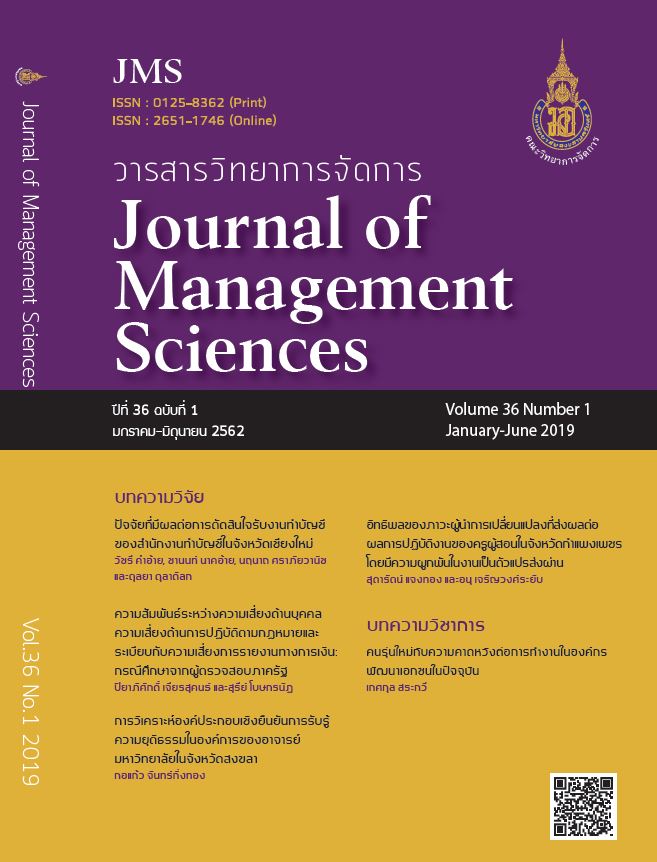Expectations of New Generations in Non-governmental Organizations
Main Article Content
Abstract
This article aims to present the expectations and self-development of the new generation in Thai non-governmental organizations. This article employed 4 important concepts as a framework: (1) Non-governmental Organizations, (2) Generation Concepts, (3) Expectation and Motivation, and (4) Self-development. Results of a comprehensive literature review showed that there were 3 types of expectations: (1) Organizational Expectations, (2) Expectations for Social Work, and (3) Personal Expectations. Self-development of the new generation in the work of non-governmental organizations consists of 2 dimensions: (1) Self-development from internal factors: self-understanding and self-awareness, self-improvement, and self-personality development until creating good habits in work; (2) Self-development by learning from the external factors: seeking information, knowledge and practices, and building relationships and working networks.
Article Details

This work is licensed under a Creative Commons Attribution-NonCommercial-NoDerivatives 4.0 International License.
All published articles are SJMS’s copyright. The editorial board allows all published articles to be copied, excerpted, or disseminated with academic citation.
References
Boonchai, K., Wisartsakul, W., and Boonyarattanasoontorn, J. (2013). The report study of the role of civil society in the protection of civil rights and political rights. National Human Rights Commission of Thailand.
Gadetud, A. (1998). Comparative Study on Factors Influencing Decision of Junior and Senior Social Worker who work for Non-Government Organizations (NGOs) in Bangkok Metropolitan area. Thesis of Master of Faculty of social Ministration, Thammasat University.
Hassarangsri, R. (n.d.). Survey of the role of NGOs in civil society. Development Study and Operation Project (Focus).
Jaeger, H. (1985). Generations in History: Reflections on a Controversial Concept. History and Theory. 24(3), 273-292. Retrieved December 25, 2018 from https://www.jstor.org/stable/2505170 (25Dec2018)
Janya, S. (2007). Development and roles of Thai NGOs. Journal of environmental management, 3(1), 85-116.
Jindasuwan, L. (2014). Attitudes of the New Generation toward Employer of Choice. A minor thesis of Master of labor and welfare development of social work, Thammasat University.
Junpet, T. (2014). Self Development of Adults. Kuakarun Journal of Nursing, 21(1), 17-23.
Life Course Associates. (1999). Generations in History. Retrieved December 25, 2018 from https://www.fourthturning.com/
Mannheim, K. (1927). The Problem of Generation. Retrieved January 27, 2019 from https://www.history.ucsb.edu
Mitrakul, S., and Kongchan, A. (2016). Generation Y in the Workplace: A Study of the Relationship between Value Congruence and Organizational Commitment. Journal of Management Sciences, 33(1), 51-75.
Office of the National Economic and Social Development Council Committee. (2014). Academic seminar Economic Division, 2014, about strengthening development partners: governing bodies Local and non-profit organizations.
Office of the National Economics and Social Development Board. (2014). Annual Economic Seminar 2014 on strengthening development partners: local administrative organizations and non-profit organizations. Monday 29 September 2014 at Boll-Room Infinity Room, Pullman Bangkok Hotel.
Pattanarangsun, R. (2001). Human Behavior and Self Development. Bangkok: Faculty of Education Chandrakasem Rajabhat University.
Pintoptang, P. (n.d.). People's Politics Civil society movement in Thai society and the role of Thai political society.
Pongsapich, A. et al. (2003). Public Voluntary Organizations in Thailand. Social Research Institute. Chulalongkorn University. The Thailand Research Fund.
Pornphimol, S. (2014). Factors governing generation Y worker’s decision to change jobs. A minor thesis of Master of labor and welfare development of social work, Thammasat University.
Rakdhum, S. (2010). Career Advancement of Workers. Bankgkok: A minor thesis of Min a Non-Governmental. A minor thesis of Master of labor and welfare development of social work, Thammasat University.
Salamon, L. M. and Helmut K. A. (1996). The International Classification of Nonprofit Organizations: ICNPO-Revision 1, 1996. Working Papers of the Johns Hopkins Comparative Nonprofit Sector Project, no. 19. Baltimore: The Johns Hopkins Institute for Policy Studies, 1996.
Simathongdham, W. (2017). The Guidelines to Solve the Problems of the Job Leaving of a New Generation of Employees. Journal of Graduate School, 12(1), 123-129.
Siripatra, B., and Munda, S. (2002). Grassroots NGOs: Varieties that society lacks (not). Local Development Institute. Bangkok: Arthid Product group.
SuthiLeartAroon, S. (2000). Human Behavior and Self-Development. Bangkok: Aksara pipat.
Suwannarat, G. (2004). Unfinished Business: ODA-Civil Society Partnership in Thailand. Translated by Pakdeebudh, J. Bangkok: CPCS, National Institute of Development Administration (NIDA).
The Office of Permanent Secretary Ministry of Labour. (2017). Labour Statistic Yearbook 2017, 7, Ministry of Labour.
ThongAun, P. (1999). Human behavior and self-development. Bangkok: Third wave Education.
Thowakulpanich, P. (2002). Motivation of New Generation Community Development Worker of Non-Government Organization in the North Eastern. Bangkok: Thammasat University.
United Nations. (2003). Department of Economic and Social Affairs Statistics Division. Handbook on Non-Profit Institutions in the System of National Accounts.
Vroom, V.H. and Deci, E. L. (1970). Management and Motivation. Victoria, Australia: Penguin Books.
Vroom, V.H. (1964). Work and Motivation. New York: John Wiley & sons, inc.
WeeraChantaChart, W., and Yaimueng, S. (1994). Personnel development in Thai NGOs. Bangkok: Development Committee and Seminar.

